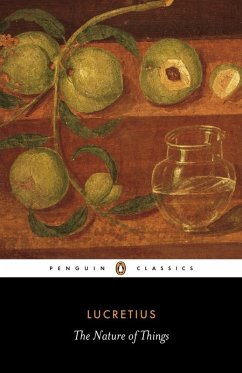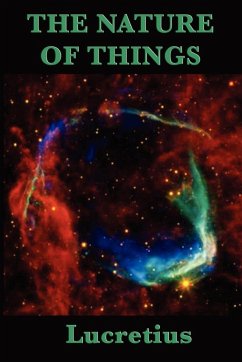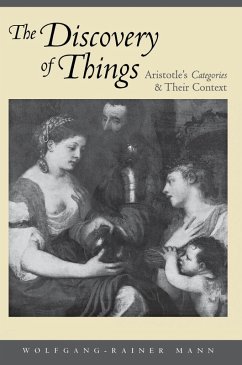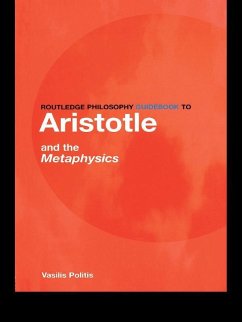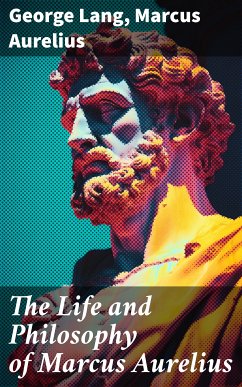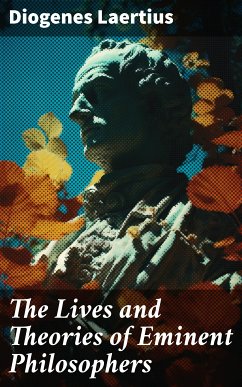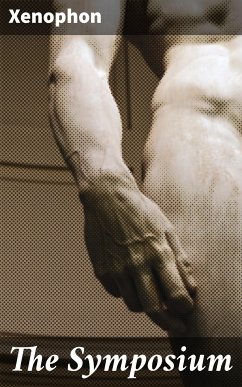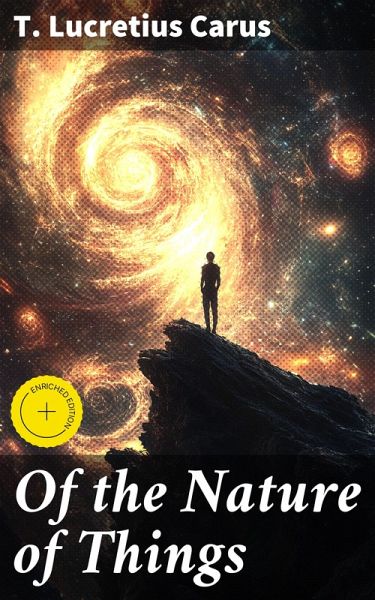
Of the Nature of Things (eBook, ePUB)
Enriched edition. Exploring the Universe: Epic Poetic Insights on Atomism and Reality
Kommentar: Watts, Samantha / Redaktion: Good Press / Übersetzer: Leonard, William Ellery

PAYBACK Punkte
0 °P sammeln!
T. Lucretius Carus's "Of the Nature of Things" is a monumental philosophical poem that intricately weaves Epicurean thought into a narrative form, exploring the nature of the universe, the principles of atomism, and the pursuit of happiness through the understanding of nature. Written in elegant Latin hexameters, Lucretius employs vivid imagery and persuasive rhetoric to engage readers' intellect and emotions alike, framing the poem against a backdrop of philosophical inquiry that challenges the fear of death and the divine. This work stands as a testament to the intersection of philosophy and...
T. Lucretius Carus's "Of the Nature of Things" is a monumental philosophical poem that intricately weaves Epicurean thought into a narrative form, exploring the nature of the universe, the principles of atomism, and the pursuit of happiness through the understanding of nature. Written in elegant Latin hexameters, Lucretius employs vivid imagery and persuasive rhetoric to engage readers' intellect and emotions alike, framing the poem against a backdrop of philosophical inquiry that challenges the fear of death and the divine. This work stands as a testament to the intersection of philosophy and poetry in the Roman literary tradition, reflecting the Enlightenment values that would later emerge in Europe centuries later. Lucretius was a Roman poet and philosopher in the 1st century BCE, whose deep engagement with the ideas of Epicurus propelled him to impart these teachings through poetic form. The prevailing superstitions and fears of his times, such as mortality and the anger of the gods, shaped his desire to convey rational thought and an understanding of the physical world, paving the way for a more enlightened perspective on life. "Of the Nature of Things" serves as a profound invitation for readers to explore the foundations of material existence and ethics in light of science rather than superstition. For those seeking a deeper comprehension of both ancient and modern thought, Lucretius's work offers timeless wisdom and an intellectually invigorating journey through the cosmos. In this enriched edition, we have carefully created added value for your reading experience: - A succinct Introduction situates the work's timeless appeal and themes. - The Synopsis outlines the central plot, highlighting key developments without spoiling critical twists. - A detailed Historical Context immerses you in the era's events and influences that shaped the writing. - An Author Biography reveals milestones in the author's life, illuminating the personal insights behind the text. - A thorough Analysis dissects symbols, motifs, and character arcs to unearth underlying meanings. - Reflection questions prompt you to engage personally with the work's messages, connecting them to modern life. - Hand-picked Memorable Quotes shine a spotlight on moments of literary brilliance. - Interactive footnotes clarify unusual references, historical allusions, and archaic phrases for an effortless, more informed read.
Dieser Download kann aus rechtlichen Gründen nur mit Rechnungsadresse in A, B, BG, CY, CZ, D, DK, EW, FIN, F, GR, H, IRL, I, LT, L, LR, M, NL, PL, P, R, S, SLO, SK ausgeliefert werden.






